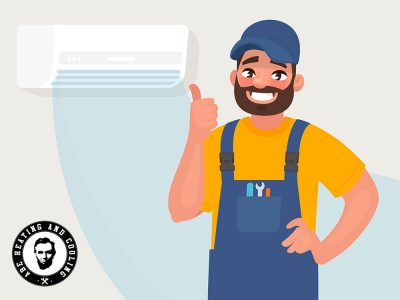“Abe's Heating and cooling were professional and on time. they helped me with two time sensitive projects and did excellent work. I know who I'll be calling if I should ever need an HVAC technician.”
Blog
 A well-maintained air conditioner will save you money, in more ways than one. It will run more smoothly and efficiently, maximizing its potential as an economical cooling appliance. It will also break down far less often, which means fewer repairs and a longer lifespan.
A well-maintained air conditioner will save you money, in more ways than one. It will run more smoothly and efficiently, maximizing its potential as an economical cooling appliance. It will also break down far less often, which means fewer repairs and a longer lifespan.
While professional maintenance services are important, there are some steps you can take on your own that can prevent future air conditioner repairs …
Thermostat batteries should be changed regularly, at least once per year. The best time to do it is right before cooling season starts. To check for systemic malfunctioning, you can use a thermometer to measure in-room temperatures. This will tell you if your air conditioner is actually in sync with your thermostat’s readings.
Misfiring or inaccurate thermostats can cause air conditioners to run too much or for too long. This can shorten an AC’s lifespan or cause an increase in mechanical problems. If the AC isn’t running long enough, because the thermostat is switching off too soon, that can lead to short cycling. This means your air conditioner will shut on and off repeatedly, which can wear the appliance and its components down more quickly.
One way to reduce thermostat troubles is to purchase a programmable model. Programmable thermostats with last longer and malfunction far less often than mechanical thermostats. With a programming function you can set the AC to switch off when you’re sleeping or not at home, reducing its overall operating hours.
The outside unit of your air conditioner (the condenser) is constantly exposed to the elements. As a result, the coils can become dirty or grimy over time. Assorted outdoor debris (leaves, grass clippings, twigs, wind-blown paper garbage, etc.) can pile up around the outside of the unit, or fall on top of it. This accumulation can restrict air flow and cause overheating, which is never a good thing with air conditioners.
Before cleaning the outdoor unit, you should first shut off the power, either at the indoor breaker panel or at the outdoor electrical disconnect box. You can use a garden hose on a low-spray setting to wash the unit, or alternatively, you can clean it with a mild soap and wash cloth. In general, it is wise to keep the area around the condenser free of any obstructions that might inhibit air flow, up to a distance of at least three feet.
With the power off, you can check the interior of the condensing unit by removing the access panel. What you’ll be looking for primarily are signs that might indicate the unit has been overheating. Melted or blackened wires and other similar types of damage should be obvious if overheating has been a problem.
Besides searching for signs of overheating, you can also check for loose connections and for indications of wearing, decay or other types of deterioration.
You don’t really have to know a lot about air conditioners to uncover this type of damage. But if you don’t feel knowledgeable enough to check electrical components and associated wiring on your own, you can ask a trained HVAC technician to do it for you, possibly during your annual spring maintenance inspection. And if you do check the condenser before that visit and find signs of damage, you should certainly let the technician handle repairs.
The condenser fan is an essential component that can cause inefficient functioning if it is not in acceptable condition. This fan can be found beneath the grill on the top of the outdoor unit.
With the power off, you can check the blades of the fan closely, to see if you can spot any indications of cracking or chipping. You should also examine them for signs of warping or bending. Blades that are damaged in any way should be replaced, to ensure smooth operation and energy-efficient performance.
Fan motor bearings on older air conditioners may need regular oiling. If you haven’t done this before, right away would be a good time to start.
Air filters capture dust, dirt, debris, pet dander and other airborne pollutants before they’re sucked into your HVAC system. This helps improve indoor air quality and protects your furnace and air conditioner from contaminants that can clog up moving parts and eventually cause a breakdown.
The one problem with air filters is that they can get dirty quickly. Once they become coated or clogged, air flow will be restricted and your air HVAC system will be forced to work harder, putting your HVAC equipment at risk for mechanical failure.
Ideally, you should replace your air filters at the beginning of each heating and cooling system, and then again on a monthly basis during the hottest or coldest weather, when your HVAC system is working its hardest. If you have disposable filters, you should clean them on the same schedule.
Home maintenance of HVAC systems and equipment is helpful. But it’s not a replacement for professional maintenance, which is necessary to ensure 100-percent efficient performance. Your results will be especially impressive if you contract ABE Heating and Cooling to handle your maintenance responsibilities, since our technicians are trained to identify problems in their earliest stages. We are located in Brighton and serve the entire Denver Metro Area, so please call us now to schedule your initial pre-summer inspection.